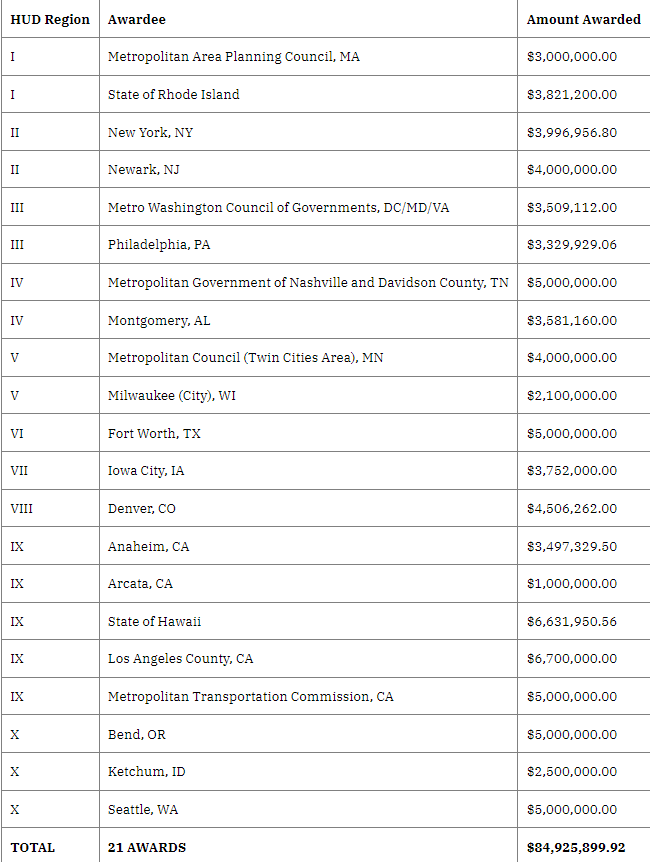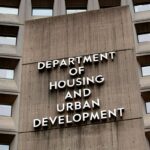U.S. Vice President Kamala Harris and U.S. Department of Housing & Urban Development (HUD) Acting Secretary Adrianne Todman have announced that the Biden Administration is awarding $85 million in grant funding for the Pathways to Removing Obstacles to Housing (PRO Housing) program, which aims to identify and remove barriers to affordable housing production and preservation, and lower housing costs.
and U.S. Department of Housing & Urban Development (HUD) Acting Secretary Adrianne Todman have announced that the Biden Administration is awarding $85 million in grant funding for the Pathways to Removing Obstacles to Housing (PRO Housing) program, which aims to identify and remove barriers to affordable housing production and preservation, and lower housing costs.
PRO Housing provides grant funding to communities actively taking steps and demonstrating progress in addressing needless local housing barriers to housing production. Winners of the PRO Housing competition will update state and local housing plans, revise land use policies, streamline the permitting process for housing construction, and take other actions to create more housing-forward communities. Grants will also be used to preserve existing affordable housing units, provide development subsidies to create new affordable units, and increase access to homeownership.
“President Biden and I believe that every American deserves affordable housing, so they have a roof over their head and a place to call home,” said Vice President Harris. “That is why we have a plan to build millions of new units of affordable housing in communities all across our nation, which will bring down the cost of housing for renters and help more Americans buy a home. Today, I am proud to announce that we are taking a critical step forward by investing $85 million to help more than 20 communities throughout our country remove barriers to building more affordable housing.”
Overcoming obstacles
Common barriers to housing identified in the PRO Housing applications include:
- The high cost of land and development
- A lack of available units
- Underutilized vacant land and property
- Aging housing stock
- Inadequate infrastructure
- Displacement pressures
- Risks of extreme weather or environment hazards
- Outdated land-use and permitting policies and processes
“President Biden and Vice President Harris have prioritized reducing housing costs,” said HUD Acting Secretary Todman. “As I travel across the country, I hear from people all the time, including builders, elected officials, and other stakeholders, about how difficult it is to build housing. This is why I am pleased to announce our first round of PRO Housing funding, which will provide communities with incentives to address their local housing barriers. This expands on our ongoing efforts to lower housing costs by increasing the housing supply.”
HUD received interest in the first round of PRO Housing funding, as applications were submitted from more than 175 communities–representing a variety of demographics, geographies, and population sizes across 47 states and territories. Successful applicants demonstrated a commitment to eliminating barriers to housing and progress toward creating more housing forward communities. The winners of PRO Housing are actively deploying strategies to boost housing supply, reform local regulations, incentivize development, prevent displacement, and encourage community driven solutions. Given the broad interest and urgent need to address housing supply, applicants will be provided technical assistance to address housing costs. Later this year, HUD will release an additional $100 million in funding available for round two of the competition. The President also included an additional $100 million for this program in his FY 25 budget.
A total of 21 awardees will receive grants in the following HUD Regions:

Narrowing the housing gap
“The creativity and innovation demonstrated by communities’ housing supply proposals made it difficult to select the 21 winners. All across the nation, locally led, community-driven approaches have begun to close the housing gap,” said HUD Principal Deputy Assistant Secretary for Community Planning and Development Marion McFadden. “This funding will accelerate the number of homes produced and rehabilitated and enable investments in community development.”
The awards will allow communities to continue to address barriers to housing construction and preservation and advance housing opportunities, and these actions build upon the Biden Administration’s Housing Supply Action Plan and HUD’s Strategic Plan to boost housing supply, lower costs for families, ensure equitable development, and build resilient, sustainable communities.
Kick-starting the PRO Housing fulfills a commitment made in the Biden Administration’s Housing Supply Action Plan, and builds on actions taken by the Administration to reduce barriers, boost housing supply, and lower costs, including:
- Leveraging discretionary grant programs to encourage state and local action to build more housing. The U.S. Department of Transportation (DOT) has updated its scoring criteria to reward applications from communities with pro-housing policies in place; already, DOT has announced approximately $22 billion in competitive grant funds using the revamped criteria. In addition, the Economic Development Administration (EDA) has updated its Investment Priorities to encourage economic development projects that enhance density.
- Updated guidance for converting commercial properties to housing. The White House released a Commercial to Residential Federal Resources Guidebook last fall, outlining more than 20 federal programs across six federal agencies that can be used to support the conversion of commercial space to affordable housing.
- Provided low-cost capital for housing, as the Federal Housing Administration (FHA) and Federal Financing Bank (FFB) Risk Sharing program provides capital to state and local housing finance agencies (HFAs), enabling them to insure multifamily loans at reduced interest rates to create and preserve high-quality, affordable rental homes.
- Finalized the Low-Income Housing Tax Credit (LIHTC) “Income Averaging” rule. To qualify for LIHTC, developers must make commitments to create housing that is affordable to households that meet specific income thresholds. Income averaging allows a developer to meet the same affordability goals by taking the average of the income for some households who are in the property as opposed to requiring all to meet the same threshold. This “average-income test” for LIHTC qualification will enable the creation of more financially-stable, mixed-income developments and make LIHTC-supported housing more feasible in sparsely populated rural areas.
- Streamlined and modernized the HOME program. Earlier this spring, HUD published a Notice of Proposed Rulemaking for the HOME Investment Partnership Program. The proposed rule, if finalized as proposed, would streamline program requirements for states and localities, better align HOME funding with other federal housing resources, reduce administrative burden for communities and housing developers, improve assistance and protections for renters, strengthen the use of HOME for homeownership activities, and encourage green and climate resilient building practices.
- Invested in making our nation’s affordable housing more energy efficient and resilient. HUD recently announced an additional $142 million in funding to support energy efficiency and climate resiliency renovations to combat the climate crisis and improve the lives of residents in HUD-supported housing through the Green and Resilient Retrofit Program (GRRP).
- Published a $235 million funding opportunity to support manufactured housing communities. Through the Preservation and Reinvestment Initiative for Community Enhancement (PRICE) Program, HUD has made $225 million available to support manufactured housing communities and residents of manufactured homes.
- Increasing loan limits for Title I Manufactured Housing. FHA published a final rule increasing loan limits for the Title I Manufactured Housing program, which insures loans to finance the purchase or refinancing of manufactured homes titled as personal property. Doing so will allow FHA to better serve low- and moderate-income and first-time buyers of manufactured housing whose financing needs have not been well-served by the private market.
- Made historic investments in homebuilding and community development in Indian Country. HUD announced the largest ever funding investment in Native American housing for affordable housing activities including new housing construction, rehabilitation, housing services, and more.
- Expanded access to financing for homes with accessory dwelling units (ADUs). Announced a new policy to allow for the inclusion of rental income from an ADU in a borrower’s income. This action enables more homebuyers to purchase a home with an ADU or seek to add one to qualify for FHA-insured financing.
Click here for more on the Biden Administration’s PRO Housing program.





